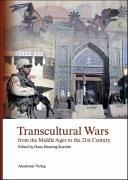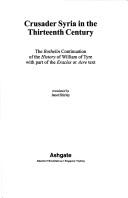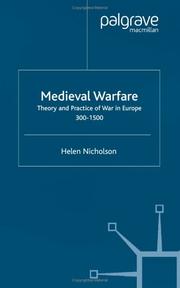| Listing 1 - 10 of 54 | << page >> |
Sort by
|
Book
ISBN: 9781849087391 9781849085038 184908503X 1849087393 Year: 2012 Volume: 185, 189 Publisher: Oxford: Osprey,
Abstract | Keywords | Export | Availability | Bookmark
 Loading...
Loading...Choose an application
- Reference Manager
- EndNote
- RefWorks (Direct export to RefWorks)

ISBN: 3050049952 9783050049953 9783050041315 3050041315 Year: 2006 Publisher: Berlin Akademie Verlag
Abstract | Keywords | Export | Availability | Bookmark
 Loading...
Loading...Choose an application
- Reference Manager
- EndNote
- RefWorks (Direct export to RefWorks)
Eine von der Deutschen Forschungsgemeinschaft getragene Forschergruppe an der Universität Regensburg untersucht seit einigen Jahren im Rahmen einer Neuen Militärgeschichte "Formen und Funktionen des Krieges im Mittelalter". Im März 2004 wurde auf einer international und interdisziplinär ausgerichteten Fachtagung, organisiert von Mitgliedern der Regensburger Forschergruppe zusammen mit dem Hamburger Institut für Sozialforschung, versucht, traditionelle Epochengrenzen, wie sie zwischen Mittelalter und Neuzeit nach wie vor bestehen, zu überwinden. Einen vielversprechenden Ansatz hierfür bot die gerade in jüngster Zeit sehr kontrovers geführte Debatte über die "Kulturen des Krieges" (John Keegan) und die mit ihr untrennbar verbundene Frage nach der typologischen Verortung der jeweiligen Konflikte. Anhand der Kategorie des "transkulturellen Krieges" wurde der Frage nachgegangen, welche Gemeinsamkeiten es zwischen mittelalterlichen und neuzeitlichen Kriegen gibt, wie neu die derzeit viel beschriebenen "Neuen Kriege" wirklich sind. Darüber hinaus wurde epochenübergreifend untersucht, was Krieg zwischen Kulturen ausmacht und wie er sich typologisch fassen lässt. War is a predominant theme in medieval as well as in modern historical research. Whereas both disciplines tend to dwell on this topic separately, this volume aims at crossing the artificial line of division between medieval and modern wars. War is regarded as a historical phenomenon the continuitiesof which prevail over any time-specific alternations. A special kind of war is the one waged between or on the line of different cultures. Such transcultural wars are currently a widespread phenomenon - but have been on the agenda throughout history. Different examples and aspects of transcultural wars are discussed in this volume. All papers were presented and discussed at a international conference held in Regensburg in March 2004 which brought war-specialists of the Middle Ages and the Modern Period together. With regard to the category of "transcultural" wars the question has been raised what medieval and modern wars have in common and whether the so called "New Wars" are that new at all. On top of that it has been examined what characteristics can be ascribed to transcultural wars, what makes these wars special and how they can best be classified.
Military history, Medieval. --- Military history, Modern. --- Culture conflict --- Cultural conflict --- Culture wars --- Conflict of cultures --- Intercultural conflict --- Social conflict --- Modern military history --- Medieval military history --- History.
Book
ISBN: 2728301603 8486839025 9782728301607 9788486839024 Year: 1988 Volume: 3 105 12 Publisher: Rome: École française de Rome,
Abstract | Keywords | Export | Availability | Bookmark
 Loading...
Loading...Choose an application
- Reference Manager
- EndNote
- RefWorks (Direct export to RefWorks)
Mediterranean Region --- Méditerranée, Région de la --- History, Military --- Congresses --- Histoire militaire --- Congrès --- Military history, Medieval --- -Medieval military history --- Circum-Mediterranean countries --- Mediterranean Area --- Mediterranean countries --- Mediterranean Sea Region --- -Congresses. --- -Congresses --- Méditerranée, Région de la --- Congrès --- Medieval military history --- Military history, Medieval - Congresses.
Book
ISBN: 1857284674 Year: 1999 Volume: *6 Publisher: London UCL Press
Abstract | Keywords | Export | Availability | Bookmark
 Loading...
Loading...Choose an application
- Reference Manager
- EndNote
- RefWorks (Direct export to RefWorks)
Croisades --- Crusades --- Histoire militaire -- Moyen-Age --- Histoire militaire médiévale --- Krijgsgeschiedenis -- Middeleeuwen --- Krijgsgeschiedenis [Middeleeuwse ] --- Kruistochten --- Medieval military history --- Middeleeuwen -- Krijgsgeschiedenis --- Middeleeuwse krijgsgeschiedenis --- Military history [Medieval ] --- Moyen-Age -- Histoire militaire --- Military art and science --- History

ISBN: 1840146060 Year: 1999 Volume: 5 Publisher: Aldershot Brookfield Ashgate
Abstract | Keywords | Export | Availability | Bookmark
 Loading...
Loading...Choose an application
- Reference Manager
- EndNote
- RefWorks (Direct export to RefWorks)
Croisades --- Crusades --- Histoire militaire -- Moyen-Age --- Histoire militaire médiévale --- Krijgsgeschiedenis -- Middeleeuwen --- Krijgsgeschiedenis [Middeleeuwse ] --- Kruistochten --- Medieval military history --- Middeleeuwen -- Krijgsgeschiedenis --- Middeleeuwse krijgsgeschiedenis --- Military history [Medieval ] --- Moyen-Age -- Histoire militaire --- Church history --- Middle Ages --- Chivalry --- Syria --- History --- -Crusades --- -Croisades --- 750-1260
Book
ISBN: 9780754659969 0754659968 Year: 2010 Publisher: Farnham Burlington Ashgate
Abstract | Keywords | Export | Availability | Bookmark
 Loading...
Loading...Choose an application
- Reference Manager
- EndNote
- RefWorks (Direct export to RefWorks)
Book
ISBN: 9781783271177 9781782046769 1782046763 1783271175 Publisher: Woodbridge ; Rochester
Abstract | Keywords | Export | Availability | Bookmark
 Loading...
Loading...Choose an application
- Reference Manager
- EndNote
- RefWorks (Direct export to RefWorks)
In 1345 Henry of Lancaster, earl of Derby - the most prominent soldier, diplomat and statesman of his generation - led an English royal army to the duchy of Aquitaine and inflicted two devastating defeats on the French royal forces. These were the first decisive victories for either side, and swung the course of the Hundred Years' War dramatically in England's favour. The remarkable success of theexpedition, however, has been overshadowed in history by Edward III's more celebrated victory at Crécy the following year.
This reassessment of a neglected campaign draws on a wealth of originalsource material to furnish an examination of the campaign "in the round"; recruitment, preparations and financial administration, as well as its events and achievements, are examined closely. A detailed biographical study of the individuals who took up arms under Lancaster's command forms a main part of this work: the portrayal of hundreds of careers in arms allows us to glean a sense of what life was like for soldiers in this army and in the later Middle Ages in general. An investigation of the men's martial experience, motivations for service and personal military networks provides an understanding of how and, indeed, why the army was so effective in the field of war. It also reveals much about the emergence of professionalism in English medieval armies and offers a reassessment of Lancaster's importance as a captain, administrator and diplomat, and above all, as a successful military commander.
Nicholas A. Gribit gained his PhD from the University of Leeds.
Book
ISBN: 9780300218145 0300218141 Year: 2018 Publisher: New Haven, CT London Yale University Press
Abstract | Keywords | Export | Availability | Bookmark
 Loading...
Loading...Choose an application
- Reference Manager
- EndNote
- RefWorks (Direct export to RefWorks)
A major new history of the Crusades that illuminates the strength and sophistication of the Western and Muslim armies During the Crusades, the Western and Muslim armies developed various highly sophisticated strategies of both attack and defense, which evolved during the course of the battles. In this ambitious new work, Steve Tibble draws on a wide range of Muslim texts and archaeological evidence as well as more commonly cited Western sources to analyze the respective armies' strategy, adaptation, evolution, and cultural diversity and show just how sophisticated the Crusader armies were even by today's standards. In the first comprehensive account of the subject in sixty years, Tibble takes a fresh approach to Templars, Hospitallers, and other key Orders and makes the controversial proposition that the Crusades were driven as much by sedentary versus nomadic tribal concerns as by religious conflict. This fluently written, broad-ranging narrative provides a crucial missing piece in the study of the West's attempts to colonize the Middle East during the Middle Ages.
Crusades --- Military history, Medieval --- Strategy --- Military strategy --- Military art and science --- Military doctrine --- Medieval military history --- Church history --- Middle Ages --- Chivalry --- Crusades. --- Military history, Medieval. --- Strategy. --- Croisades --- Histoire militaire --- Stratégie --- Stratégie
Book
ISBN: 0429317859 1000576523 0367330679 9781032227092 1032227095 9780367330675 Year: 2022 Publisher: London New York Routledge
Abstract | Keywords | Export | Availability | Bookmark
 Loading...
Loading...Choose an application
- Reference Manager
- EndNote
- RefWorks (Direct export to RefWorks)
This Variorum collection of articles is intended to illustrate that conflict in the late Middle Ages was not only about soldiers and fighting (about the makers and the making of war), important as these were. Just as it remains in our own day, war was a subject which attracted writers (commentators, moralists and social critics among them), some of whom glorified war, while others did not. For the historian the written word is important evidence of how war, and those taking part in it, might be regarded by the wider society. One question was supremely important: what was the standing among their contemporaries of those who fought society's wars? How was war seen on the moral scale of the time? The last two sections deal with a particular war, the 'occupation' of northern France by the English between 1420 and 1450. The men who conquered the duchy, and then served to keep it under English control for those years, had to be rewarded with lands, titles, administrative and military responsibilities, even (for the clergy) ecclesiastical benefices. For these, war spelt 'opportunity', whose advantages they would be reluctant to surrender. The final irony lies in the fact that Frenchmen, returning to claim their ancestral rights once the English had been driven out, frequently found it difficult to unravel both the legal and the practical consequences of a war which had caused a considerable upheaval in Norman society over a period of a single generation. --
Military art and science. --- Military history, Medieval. --- Europe --- History, Military. --- Medieval military history --- Fighting --- Military power --- Military science --- Warfare --- Warfare, Primitive --- Naval art and science --- War --- Histoire militaire --- Military art and science --- Art et science militaires --- History --- Military history, Medieval

ISBN: 0333763300 0333763319 Year: 2004 Publisher: Basingstoke ; New York Palgrave Macmillan
Abstract | Keywords | Export | Availability | Bookmark
 Loading...
Loading...Choose an application
- Reference Manager
- EndNote
- RefWorks (Direct export to RefWorks)
Military history, Medieval. --- Military art and science --- Military weapons --- Fortification --- Histoire militaire médiévale --- Art et science militaires --- Armes de guerre --- Fortifications --- History --- Histoire --- Europe --- History, Military. --- Histoire militaire --- -Military weapons --- Instruments of war --- Military supplies --- -Medieval military history --- Military history, Medieval --- 355 <09> --- Medieval military history --- 355 <09> Militaire geschiedenis --- Militaire geschiedenis --- Armaments --- Munitions --- Weapons --- Disarmament --- Medieval warfare --- Fortification, Primitive --- Forts --- Military engineering --- Siege warfare --- Combat weapons
| Listing 1 - 10 of 54 | << page >> |
Sort by
|

 Search
Search Feedback
Feedback About UniCat
About UniCat  Help
Help News
News